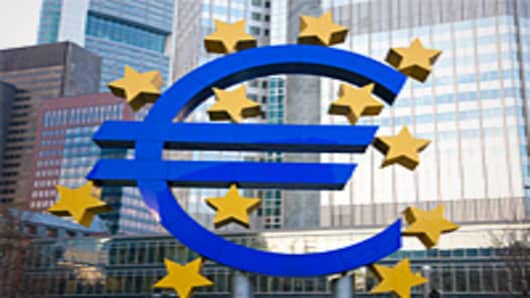When Tim Geithner called into a conference call with his G7 peers Sunday night to discuss the Greek crisis, he could have been forgiven for thinking back to a Sunday night in September 2008 when he ran the New York Fed.
The reason for his memory to focus on that fateful weekend when Lehman Brothers went under and sent global markets into meltdown is there is currently so little consensus on what to do about Greece and its debt burden that he must have remembered a similar tone in his offices in New York as was on view in Luxembourg over the weekend, when euro zone policy leaders met and decided to do nothing; we will figure it out next month was the message.
Hank Paulson and Geithner did not have the luxury of delaying a decision on Lehman Brothers; the euro zone simply has no choice on delaying a decision as the key players remain completely divided on what to do next.
In Germany Angela Merkel and her finance minister Wolfgang Schaeuble are desperate for a deal that gives them the ability to tell angry German voters that it is not just their taxes that will be lost in the battle to keep Greece solvent.
"Merkel urges 'substantial' aid from private creditors in resolving crisis," read one headline.
"Greece must first meet conditions before payment," Schaeble told a German radio station as he pleaded with the ECB to reach a compromise on what to do next.
The chair of the euro group Jean-Claude Juncker dismissed the German positiontelling Sueddeutsche Zeitung that involving private sector creditors in a debt restructuring plan for Greece is "playing with fire" and warning a Greek default could spark contagion risk for Ireland and Portugal, as well as Belgium, Italy and Spain.
Trichet Saying Very Little
With Moody’s warning of a possible downgrade of Italy to add to the sense of chaos Jean-Claude Trichet used a speech on Sunday in Germany to say very little.
Talking about global imbalances, which is now widely seen as code for "I don’t want to talk about the debt crisis," the boss of the ECB simply criticized a lack of governance in euro zone countries.
There will be another meeting in Luxembourg Monday that will see the International Monetary Fund weigh in on the outlook for the euro zone before a no-confidence vote in the Greek government on Tuesday and a heads of state summit in Brussels on Thursday and Friday.
Late last week Angela Merkel and Nicolas Sarkozy met to discuss a private sector involvement of Greek bondholders that is likely to take the form of a voluntary roll-over of debt.
While Sarkozy and Merkel agreed on such an outcome, there remains a long way to go before such a deal is signed off and the implications of such a deal on markets remain unclear.
“It is a relief to know that Germany is not going to try to bully euro land into making a Lehman-like mistake and let Greece slide into default.
However, that does not mean a default by Greece is no longer imminent.
It only means the EU governments will not force a default in this specific way,” Carl Weinberg, the chief economist at High Frequency Economics, wrote in a research note on Monday.
The big question is now whether the Greeks will accept more austerity and if they don’t what impact that will have on global markets.
“If Greece does not approve the IMF program, or if the government fails altogether, the only way to get bridge financing to Greece fast is for the EU governments to agree to allow the EFSF to lend money without conditions,” Weinberg said.
Everything Hinges on EU
We will know whether Greece’s parliament will pass the latest austerity measures on Tuesday, but whether they can actually achieve them in practice, having failed to meet the terms of previous austerity packages, remains a doubt.
CNBC’s ECB correspondent is attending the finance ministers meeting in Luxembourg and believes no one can move until the EU makes up its mind on what to do next and compares the talks to a room of cats biting each other on the tail and achieving nothing.
On Friday, Joseph Ackermann, the CEO of Deutsche Bank told CNBC we need an agreement soon.
"We have to have clarity in the coming days," Ackermann said.
"I do hope it happens. If they delay until September, who knows what will happen over the summer break in terms of discussion?"
The fear is that the crisis spreads from Greece to Ireland, Portugal, Spain and even Italy as Juncker warned Sunday night.
If that were the case, the European banking sector and global markets could see another Lehman-like event, according to one analyst.
"Clearly we know that there are certain areas which are clearly vulnerable because of the high stock of Greek debt which is being held in certain banks... French banks stand out for example, they're clearly the first on the hook," Richard McGuire, the senior fixed income strategist at Rabobank told CNBC in an interview on Monday.
"Something in the region of nine percent of French banking claims are in the periphery, not just Greece (I think it's about one percent for Greece), but clearly if Greece goes, concern is that restructuring will then spiral across the euro zone," McGuire said.
"The problem is it's hard to know which banks lent to which banks which then lent to Greece, that gives it a sort of Lehman-esque style quality," he added.



